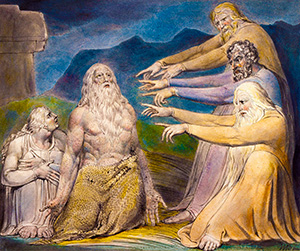WAS THE STORY OF JOB about a real human being in history?
Or was Job a fictional character in something like a really long parable—a bit like the guy who got beat up in Jesus’ story about a Good Samaritan?
I think most of us have grown up assuming he was a real guy. So we’ve speculated about when and where he lived, though the anonymous writer doesn’t give us many clues to go on.
In recent years, some Christians have started to question their old presumptions.
For many folks, the point of the story seems obvious: suffering isn’t necessarily linked to sin. Jews often presumed people suffered because God was punishing them. That’s why the disciples pointed out a man born blind and asked Jesus,” Was it because of his own sins or his parents’ sins?” (John 9:2 NLT).
Job’s story seems to argue against that kind of thinking.
But there are several reasons some Bible experts suspect the story was fictional.
- Reporting from heaven. How did the writer get info on the meeting between Job’s Accuser and God in heaven?
- God’s bet with the devil. Assuming Job’s Accuser was Satan, as many do, what was he doing on God’s turf and why did God make a deal with the devil?
- Before audio recording. The debate between Job and his supposed friends is reported in astonishing detail. Who could take notes like that—especially if the story played out around the time of Abraham—as many guess it did? That was centuries before the Jews invented their alphabet?
Two questions:
Do you think Job’s story may have been a parable kind of a thing?
Would it diminish your view of the Bible if, in fact, Job turned out to be a fictional character crafted by a novelist/theologian trying to teach people a lesson about God?


I’ve always struggled with Job’s story, but never stopped to consider whether he was real or fictional. Could it be the writer of Job was himself ruminating over many misfortunes in his own life, whether he had somehow caused them by his own sin, working through why his so called “friends” blamed him rather than pulled him up. Perhaps the writer was illustrating that process we go through before we quiet down into the comfort and peace of knowing that God is there and not forsaking us.
That’s a good point, Rose. I think many Christians would resist the idea that the story of Job is fiction. But if it is fiction, the background to it would be anyone’s guess.
Jesus tells us God is a loving father, how could a loving father let so much suffering on a man to prove a point, and how is it OK to take all his children and suppose his new kids could ever take their place, doesn’t make any sense.
It’s fictional. It serves as a parable to illustrate patience as a virtue. One has to really stretch credulity to defend two deities speaking to each other and betting on who “Job” was going to be loyal to. Think about it.
Thanks Tabitha. You’d upset some Christians, and make others quite happy. Peace to you.
I’m OK with God conferring with the Divine Council, I’m a big fan of the YouTube presentations of the late Michael Heiser (RIP) who’s helped me with this. What stretches belief for me is the list of disasters that successively land on Job, one after another (I know that’s already covered by “successively”, my vocab isn’t what it used to be ?). It’s just not believable to me. Certainly not to the atheist/sceptic friends and family I talk to. Everyone I meet seems to hold to secular belief systems these days sadly, at least in my country (Australia).
I have no answer to that. I want to believe that the Bible is factual and inerrant and that there is an unseen realm in which God and the (rest of the) divine council, the Sons of God, regularly meet and confer. But the story of Job? It seems like a bridge too far. All I can think to say to my sceptical friends if they ask me is maybe it’s an allegory.
I’ve been paraphrasing the Casual English Bible and I can assure you that the Bible we hold in our hands today…any version…is not inerrant. Job reads like well-written fiction. intent on showing that, contrary to popular belief in Bible times, good and innocent people suffer, too. Suffering doesn’t mean God is punishing us. From a practical standpoint, what reporter could take such extensive and accurate notes as the writer of Job? I used to be a newspaper reporter, and I certainly couldn’t. In Job’s day, who knew how to read anyhow? But as fiction, like a long parable, it makes perfect sense. To me, at least.